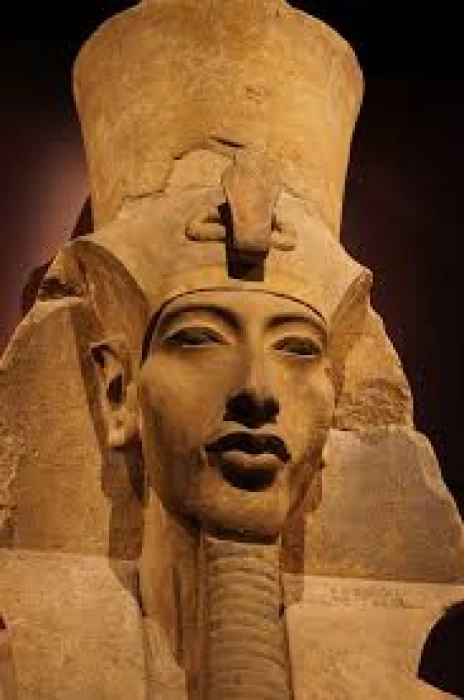
阿肯那顿国王 | 阿蒙霍特普四世 | 古埃及的一神论
阿肯那顿国王
法老Akhenaten,谁在第18王朝统治埃及的新王国,统治从1353年到1336BCE。 他的其他名字,都翻译成"成功的"或"对神Aten有很大的用处",是"Akhnaton","Akhenatenaton","Ecnaton"或"Ijnaton"。"
因此,这是建立一神论宗教的尝试;Amarna的坟墓特别被转移到尼罗河东岸,但面向西。
Akhenaten尝试提前结束。 在他去世后,他登上王位作为年轻的图坦卡门,谁重新开放阿蒙的寺庙崇拜,带来了首都底比斯,并改名为图坦卡门,而不是他的父亲,阿肯那顿给他的名字,
阿肯那顿是第一位已知的一神论者,他发起了一场持续17年的重大神学、政治和宗教革命,在他统治期间对历史产生了影响。
阿滕革命
在他所有的改革中,也许最显着的是将太阳盘阿滕提升为首席神的位置。 在他统治的最初几年,他逐渐从传统的多神教(尊重阿蒙、奥西里斯和拉神)向阿滕的专属崇拜转变。 在统治的第五年,他再次确认了他的名字,并增加了一个新的名字:Akhenaten,意思是"对Aten有效",以纪念他的新神。
此外,Akhenaten将首都从底比斯改为他制作的一个名为Akhetaten(现代Amarna)的新城市。 这座城市的建造意图是成为阿滕的崇拜中心和整个埃及的行政中心。 这是他所做的最大胆的行为,因为这完全切断了阿蒙强大的祭司办公室对整个社会的许多世纪的影响。
阿马尔纳市阿蒙霍特普四世国王
阿蒙霍特普四世(公元前1372-1354年),阿蒙霍特普三世之子,奈费尔提提的丈夫。 Akhenaten是埃及历史上独一无二的人物;他通过引入一神教结束了千禧年的宗教秩序。 新王国第18王朝的君主,他承担了阿顿神的名字,即太阳神,与他确定自己。 在强迫这种神性的崇拜之后,法老将首都从底比斯转移到Akhetaten,这是El Menya目前的Tell El-Amarna市,它成为新邪教的中心,并与试图保持阿蒙神崇拜的强大牧师作战。
然而,这种新文化的繁荣以阿肯那顿国王的去世而告终。 在阿肯那顿死后几年登上王位的图坦卡蒙将首都带回底比斯,并再次恢复了对阿蒙的崇拜。
在开罗的埃及博物馆内展出的他的家族雕像是古埃及艺术在阿玛纳时期如何改变的最伟大的例子。
Pharaoh Akhenaten, who ruled the New Kingdom of Egypt during the 18th Dynasty, ruled from 1353 to 1336 BCE. His other names, which all translate to "successful for" or "of great use to" the god Aten, are "Akhnaton," "Akhenatenaton," "Ecnaton," or "Ijnaton."
The Akhenaten attempt ended early. After his death, he ascended to the throne as the young Tutankhamen, who reopened the temples of Amun for worship, brought the capital to Thebes, and changed his name to Tutankhamen instead of the name given by his father, Akhenaten, which was Tutankhaten.
Akhenaten, the first known monotheist, initiated a significant theological, political, and religious revolution lasting 17 years, impacting history throughout his reign.
Of all his reforms, perhaps the most marked was that of elevating Aten, the sun disk, into the place of chief deity. In the first years of his reign, he gradually brought about the transition away from traditional polytheism, which honored the gods Amun, Osiris, and Ra, toward the exclusive worship of Aten. In the fifth year of rule, he reconfirmed his name, adding to it a new one: Akhenaten, which means "Effective for Aten," in honor of his new deity.
Also, Akhenaten changed the capital city from Thebes to a new city he made called Akhetaten (the modern-day Amarna). This city was built with the intention that it would be the center of worship of Aten and the administrative point for the whole of Egypt. This act was the most audacious he did because it was a total cut-off from the very many centuries-old influence of the powerful priestly office of Amun over society in general.















